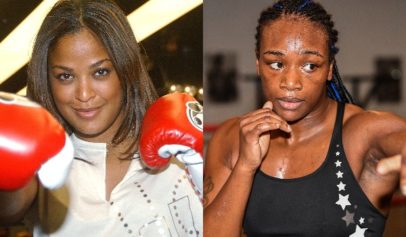This is why no other fighter – or athlete, for that matter – can be compared to Muhammad Ali: His impact outside the athletic arena has been more profound than his dynamic career inside the boxing ring.
That fact was reiterated Thursday when Ali, 70, received the Liberty Medal for his virtually life-long commitment to championing humanitarian causes, civil rights and religious freedom.
Hundreds of people gathered on the lawn of the National Constitution Center in Philadelphia to watch the three-time heavyweight champion receive the honor that his wife, Lonnie Ali, called “overwhelming.”
“It is especially humbling for Muhammad, who has said on many occasions, ‘All I did was to stand up for what I believe,’ ” Lonnie Ali said
Severely limited by a 30-year battle with Parkinson’s disease, Ali did not speak. But he stood with assistance to receive the medal from his daughter, Laila Ali.
He looked down at his medal for several moments and then waved to the crowd. The award comes with a $100,000 cash prize.
Ali was born Cassius Clay but changed his name after converting to Islam in the 1960s. He refused to serve in the Vietnam War because of his religious beliefs and was stripped of his heavyweight crown in 1967. A U.S. Supreme Court ruling later cleared him of a draft evasion conviction, and he regained the boxing title in 1974 and again 1978.
One of his most famous fights took place in Zaire, now the Democratic Republic of the Congo, where he battled George Foreman in the “Rumble in the Jungle” in 1974.
At the ceremony Thursday, retired NBA star Dikembe Mutombo recalled the impression Ali’s visit made on him as an 8-year-old growing up in that country.
“He changed my life,” said Mutombo, who also is a trustee of the Constitution Center. “I can never forget how inspired I was to see a black athlete receive such respect and admiration. He changed how the people of Zaire saw themselves, and in turn how the world saw them.”


